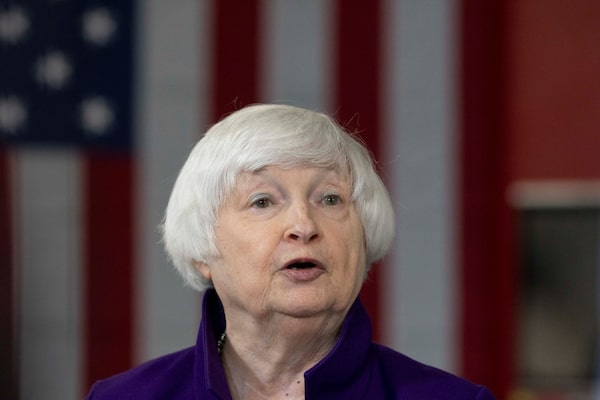
U.S. Treasury Secretary Janet Yellen, in Norcross, Georgia, on March 27.CHRISTIAN MONTERROSA/Getty Images
U.S. Treasury Secretary Janet Yellen will return to China this week to continue her economic dialogue with top Chinese officials amid a new emphasis on the global threat posed by the Asian superpower’s growing excess industrial capacity, the Treasury Department said on Tuesday.
The April 3-9 trip, which will be Ms. Yellen’s second in-person visit to China since July, 2023, will include a stop in the southern factory hub of Guangzhou before Beijing.
U.S. President Joe Biden and Chinese President Xi Jinping were scheduled on Tuesday to hold their first direct talks since November, in a call in which the U.S. leader will seek to ease tensions over Taiwan’s presidential inauguration in May.
Mr. Biden administration officials said that both Mr. Biden and Ms. Yellen will be emphasizing the need for China to create a “fair and level playing field” for U.S. workers and companies.
In Guangzhou, Ms. Yellen will meet with Chinese Vice-Premier He Lifeng, Guangdong Province Governor Wang Weizhong and executives of U.S. companies in China, the Treasury Department said. She will hear first-hand about business climate challenges that are prompting U.S. firms to limit their investment in China.
Ms. Yellen last met with Mr. He, her main Chinese economic counterpart, in November, 2023, ahead of the Asia-Pacific Economic Co-operation Summit in San Francisco, where Mr. Biden also met with Mr. Xi.
Since Ms. Yellen’s first visit to Beijing last July, she and Mr. He have launched economic and financial working groups that meet virtually. The dialogue so far has been largely focused on discussing key economic issues facing each country and their respective policy responses, such as the property market troubles in China that have undermined consumer confidence, or the failures of two major U.S. regional banks last year.
U.S. Treasury officials also have used the dialogue to explain that U.S. national security restrictions on semi-conductors and U.S. investment into China will be narrowly targeted.
The increased U.S. emphasis on Chinese excess capacity represents a shift in the discussions at a time when China’s exports are growing amid weak demand at home. Mr. Xi has also pledged to unleash “new productive forces” in China by investing in developing technology industries including electric vehicles (EVs), new materials, commercial space flight and life sciences.
Ms. Yellen said last week at a Suniva solar module factory near Atlanta that Chinese government support has led to “substantial overinvestment” in steel, aluminum and other industries, paving the way for cheap exports that have forced manufacturing in other, market-driven countries to contract.
“Now, we see excess capacity building in ‘new’ industries like solar, EVs, and lithium-ion batteries,” Ms. Yellen said during her trip last week, adding that this was distorting prices and production patterns and hurting workers in the U.S., European Union and other economies.
Asked if she would raise the threat of new trade barriers on her next China visit, Ms. Yellen said she did not want to “get into retaliation,” adding: “We want to see what we can do that’s constructive.”
The EU is investigating whether China’s EV industry is benefiting from unfair subsidies, a probe that could lead to tariffs to protect European carmakers. The U.S. Commerce Department has opened a probe into whether Chinese vehicles pose national security threats owing to the data they transmit, and the Biden administration is facing growing calls from lawmakers to hike tariffs on Chinese EVs.
A U.S. Treasury official told reporters that Ms. Yellen during her upcoming China trip would “make clear the global economic consequences of Chinese industrial overcapacity undercutting manufacturers in the U.S. and firms around the world.”
The official, speaking on condition of anonymity, said U.S. and Chinese officials would likely discuss currency matters as a routine part of their economic talks, but declined to comment on recent weakness in China’s yuan currency.
The official added that Ms. Yellen would seek further co-operation in areas mutually beneficial to both countries, including fighting climate change, combatting illicit financing and narcotics trafficking and providing relief to debt-distressed developing countries.